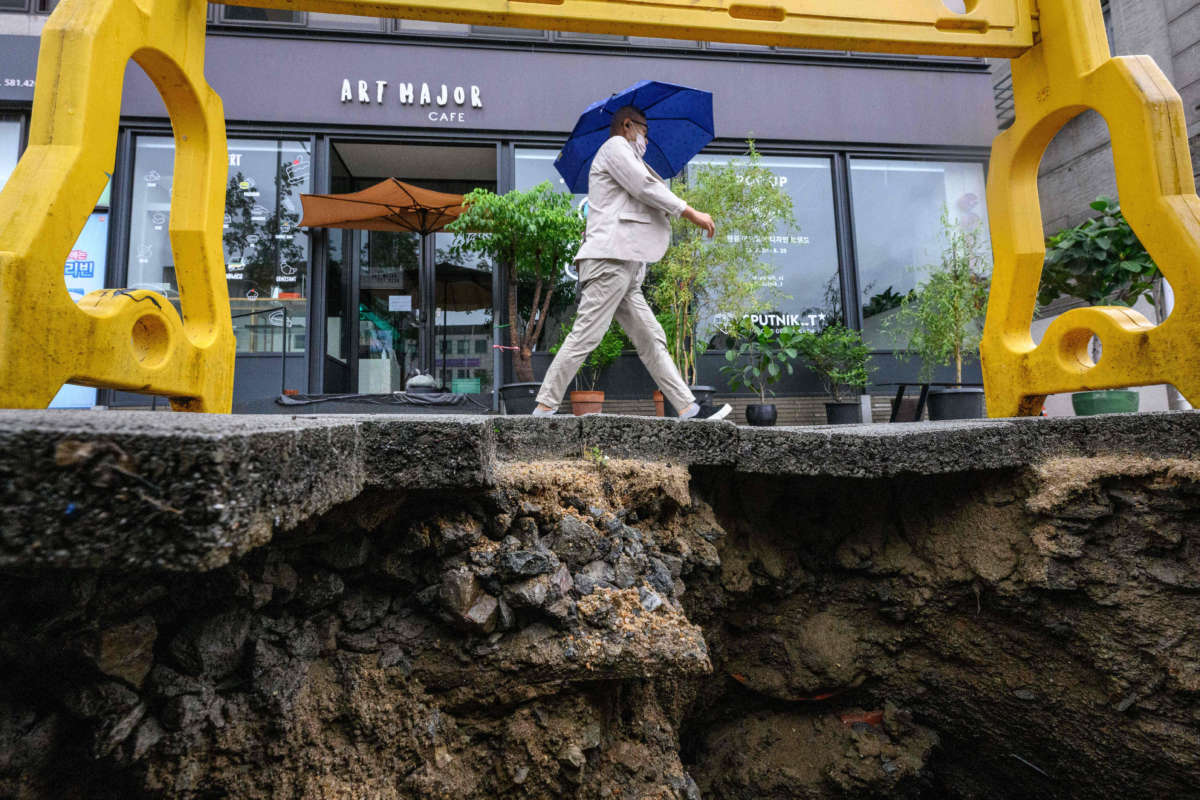Record-shattering rainfall in Seoul, South Korea overnight Monday killed at least eight people and — according to scientists — offered further evidence that the planet is in the midst of a climate disaster.
According to The New York Times, “Three of the dead, two sisters in their 40s and a 13-year-old girl, were found early Tuesday as emergency workers pumped out the water that had flooded their semi-basement home in southern Seoul.”
“Another was a municipal employee, apparently electrocuted while removing a tree that had fallen onto a sidewalk,” the Times reported, citing local authorities. “In addition to the eight confirmed deaths, officials said seven people were missing after floodwaters pulled them into manholes, underground passages, or streams.”
The Korea Meteorological Administration said the downpour marked the largest total amount of rainfall experienced in the city in eight decades. Increasingly extreme rain and flooding have been linked to the human-caused climate crisis, driven by the continued burning of fossil fuels.
“It’s the rainiest day in the history of Seoul,” wrote meteorologist Eric Holthaus. “Three hundred seventy-nine millimeters (15 inches) of rain in just 12 hours — two months’ worth of rain in half a day.”
“We are in a climate emergency,” Holthaus added.
Video footage and photos posted to social media show cars completely submerged in water in downtown Seoul, where some drivers were forced to abandon their vehicles in search of safety.
“This is what happens when you warm a planet,” environmentalist Bill McKibben tweeted, responding to a photo of a man sitting on top of his car as water engulfed it.
This is like a horror movie 😱pic.twitter.com/QxmQmSqhLa
— Raphael Rashid (@koryodynasty) August 8, 2022
This is absolutely insane video in South Korea. Extreme flooding that hasn’t been seen in 80 years or more. Very extreme flooding, causing massive problems in Seoul and the entirety of the country. #SouthKorea #flooding #weather pic.twitter.com/88xOxVuN4B
— Michael Steinberg (@MichaelWX18) August 8, 2022
The Korea Times reported Tuesday that “the unprecedented amount of continuous rainfall impacted underground metro stations as well.”
“The ceiling over a platform in Isu Station in Dongjak District collapsed, dropping a torrent of rain and ceiling panels onto the platform,” the outlet noted. “The underground levels of several other metro stations in the city were also flooded, causing trains in operation to pass the inundated stations and forcing people inside the stations to look for other forms of transportation.”
The destructive rain in South Korea’s capital came as U.S. President Joe Biden traveled to Kentucky to survey the devastation inflicted last month by the worst flooding in the state’s history.
“The risk of flooding is going up dramatically over much of the planet where people live, and Kentucky is one of those places,” Jonathan Overpeck, an earth and environmental sciences professor at the University of Michigan, told Inside Climate News in a recent interview. “The evidence is clear that climate change is a growing problem for Kentucky and the surrounding region.”
As Reuters observed in June, “Extreme weather events — from scorching heatwaves to unusually heavy downpours — have caused widespread upheaval across the globe this year, with thousands of people killed and millions more displaced.”
“Monsoon rains unleashed disastrous flooding in Bangladesh,” Reuters noted. “Overall, episodes of heavy rainfall are becoming more common and more intense. That’s because warmer air holds more moisture, so storm clouds are ‘heavier’ before they eventually break.”
Join us in defending the truth before it’s too late
The future of independent journalism is uncertain, and the consequences of losing it are too grave to ignore. To ensure Truthout remains safe, strong, and free, we need to raise $44,000 in the next 6 days. Every dollar raised goes directly toward the costs of producing news you can trust.
Please give what you can — because by supporting us with a tax-deductible donation, you’re not just preserving a source of news, you’re helping to safeguard what’s left of our democracy.
